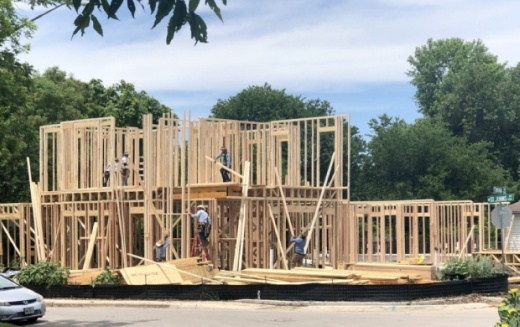Paladino is suing the city for allegedly circumventing Texas House Bill 3167, a 2019 law that requires permitting entities to approve or deny site plan and plat applications for subdivision projects within 30 days. Paladino’s application to subdivide one half-acre lot in South Austin was filed in November 2019, but the city has yet to officially begin the review of Paladino’s application, first sending it through a “preapplication check” process that has lasted nearly a year.
“Eleven months later and I have nothing. I do not have an approval or denial or conditional approval. What I have got are a dozen emails from the city saying, ‘Oh, we’re reviewing it against code,’” Paladino told Community Impact Newspaper.
Before HB 3167 passed in 2019, it took an average of around 37 days for Austin to complete a single round of permitting—not limited to subdivision permits. Often, several more rounds ensued to address issues pointed out by multiple departments.
“I was hopeful that the city would look at this and say, ‘There's no way. There is no amount of staff we could hire to do all of the reviews we want to do in 30 days. We're going to have to make the process simpler,” Paladino said.
Representatives for the development services department did not specifically respond to Community Impact Newspaper’s questions regarding Paladino’s case, but Robbie Searcy, the public information specialist for the department, said the preapplication check process “is intended to help developers identify potential complications that need to be addressed prior to submittal.”
Additionally, Searcy said the department was “proud of its collaborative work with the regulated community to achieve compliance with HB 3167.”
Other Austin development professionals expressed similar concerns to Paladino’s. Chris Peterson of Riverdale Homes said his experiences with the city have led him to adjust his business practices to avoid the most cumbersome parts of the permitting process for large subdivision projects.
“We're building in the city of Austin, but we look for other opportunities where we don't have to process maps and spend the time or the money to do that. We let other people do it and take the headache and buy it after it's been processed, or we'll just buy individual lots,” Peterson said.
Ultimately, a slow permitting process impacts more than just developers, according to David Glenn, the senior director of government relations for the Home Builders Association of Greater Austin. He said the city’s permitting process “is absolutely a barrier to housing [supply],” which is at a critically low point in 2020 and is playing a role in driving up costs for homebuyers.
“There's a lot of nexuses between the permitting process and affordability,” Glenn said. “One of our biggest concerns is just the timeliness in which we hear what the errors are in the plan. Just having that open communication is sometimes difficult to achieve.”
Greater efficiency in permitting would not only make developers’ jobs easier, Glenn said, but would also benefit the city by getting housing—and thus additional tax dollars and accompanying infrastructure—online sooner.
“There are always efficiencies that can be gained. But the problem is it's sometimes difficult for cities to identify and then realize these inefficiencies and then take action to correct them,” Glenn said. “I think that’s a good discussion that the city needs to have with the development community.”





